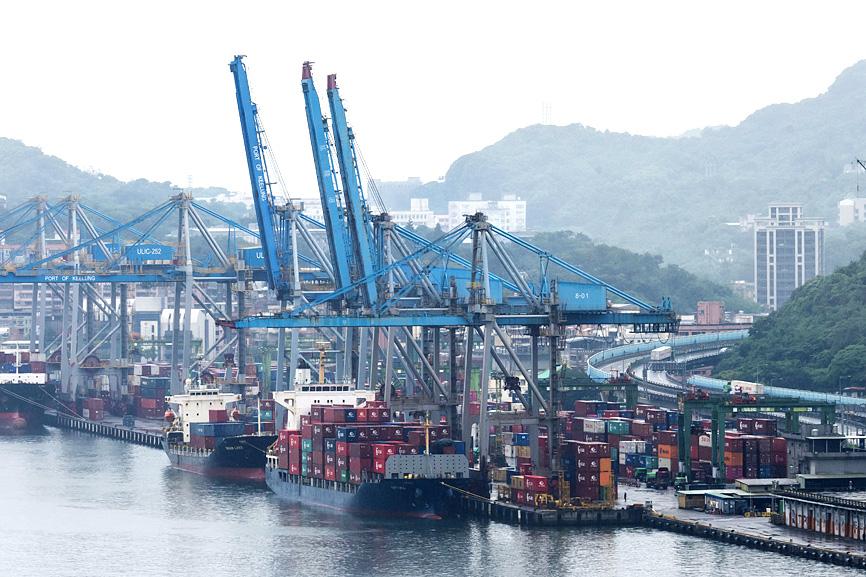Evergreen Marine Corp (長榮海運) and Yang Ming Marine Transport Corp (陽明海運) last week denied US accusations of colluding with other shipping companies to fix prices, pledging to help in an investigation into such complaints amid a global shortage in marine cargo shipping services.
The allegations came as the US is experiencing high inflation, partly driven by the expensive cost of shipping since its economy began reopening after disruptions related to COVID-19.
Evergreen and Yang Ming said that cargo service prices are set based on US regulations, and their pricing had been reported to US marine authorities.

Photo: Bloomberg
The two shippers said they would work with the US Federal Maritime Commission (FMC) in its probe into complaints regarding fees charged by shipping companies and terminal operators.
Earlier last week, the commission announced an audit program and a dedicated team to assess compliance with its rule on detention and demurrage — a charge paid to the owner of a chartered ship for failure to load or discharge the ship within the agreed time — as cargo vessels are stuck in major US ports.
The move aims to provide more information that benefits the market by regularly monitoring cargo services, the commission said.
The audit program would analyze the top nine carriers by market share for compliance with detention and demurrage rules in the US, it said.
The commission’s probe targets Evergreen and Yang Ming, as well as Denmark’s A.P. Moller-Maersk A/S, Switzerland-headquartered Mediterranean Shipping Co, China-based COSCO Shipping Holdings Ltd (中遠海運控股), France’s Le Groupe CMA CGM, Germany’s Hapag-Lloyd AG, South Korea’s Hyundai Merchant Marine Co and Japan’s Ocean Network Express.
Evergreen and Yang Ming said that if the commission needs more information, they would provide it to facilitate the investigation.
There has been no collusion in pricing among the world’s major shippers, Yang Ming president Patrick Tu (杜書勤) said.
Tu quoted US President Joe Biden as saying that the US government has no intention of intervening in the international cargo shipping market.

Intel Corp chief executive officer Lip-Bu Tan (陳立武) is expected to meet with Taiwanese suppliers next month in conjunction with the opening of the Computex Taipei trade show, supply chain sources said on Monday. The visit, the first for Tan to Taiwan since assuming his new post last month, would be aimed at enhancing Intel’s ties with suppliers in Taiwan as he attempts to help turn around the struggling US chipmaker, the sources said. Tan is to hold a banquet to celebrate Intel’s 40-year presence in Taiwan before Computex opens on May 20 and invite dozens of Taiwanese suppliers to exchange views

Application-specific integrated circuit designer Faraday Technology Corp (智原) yesterday said that although revenue this quarter would decline 30 percent from last quarter, it retained its full-year forecast of revenue growth of 100 percent. The company attributed the quarterly drop to a slowdown in customers’ production of chips using Faraday’s advanced packaging technology. The company is still confident about its revenue growth this year, given its strong “design-win” — or the projects it won to help customers design their chips, Faraday president Steve Wang (王國雍) told an online earnings conference. “The design-win this year is better than we expected. We believe we will win

Quanta Computer Inc (廣達) chairman Barry Lam (林百里) is expected to share his views about the artificial intelligence (AI) industry’s prospects during his speech at the company’s 37th anniversary ceremony, as AI servers have become a new growth engine for the equipment manufacturing service provider. Lam’s speech is much anticipated, as Quanta has risen as one of the world’s major AI server suppliers. The company reported a 30 percent year-on-year growth in consolidated revenue to NT$1.41 trillion (US$43.35 billion) last year, thanks to fast-growing demand for servers, especially those with AI capabilities. The company told investors in November last year that

Power supply and electronic components maker Delta Electronics Inc (台達電) yesterday said it plans to ship its new 1 megawatt charging systems for electric trucks and buses in the first half of next year at the earliest. The new charging piles, which deliver up to 1 megawatt of charging power, are designed for heavy-duty electric vehicles, and support a maximum current of 1,500 amperes and output of 1,250 volts, Delta said in a news release. “If everything goes smoothly, we could begin shipping those new charging systems as early as in the first half of next year,” a company official said. The new